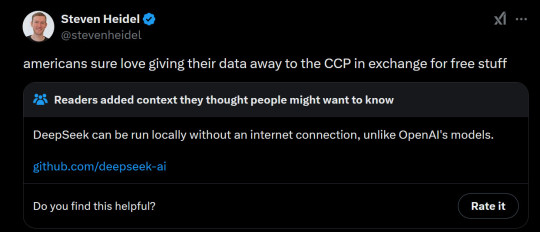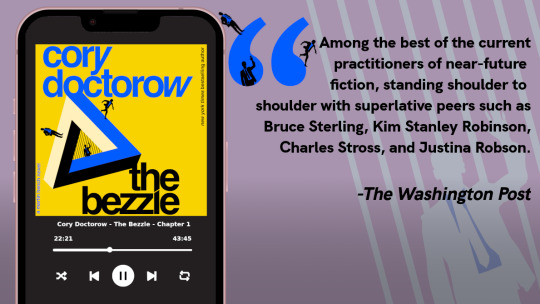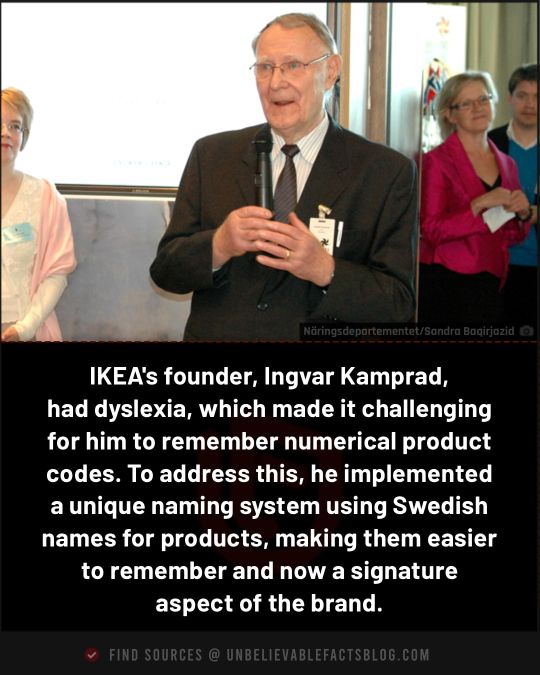#innovation
Explore tagged Tumblr posts
Text
Let’s please realize that this story of success is a form of history lesson called “Open Sourcing” and it doesn’t have to be limited to China. Empowering people with access to the constituent elements of value creation *always* expands market access.
Let’s not pretend China 🇨🇳 hasn’t just been stealing our technology for 30 years. Let’s also not pretend the source of US manufacturing dominance is TSMC, in Taiwan 🇹🇼 And let’s definitely not forget that OpenAI was *supposed* to be Open and in Open Source.
I am very wary of people going "China does it better than America" because most of it is just reactionary rejection of your overlord in favor of his rival, but this story is 1. absolutely legit and 2. way too funny.

US wants to build an AI advantage over China, uses their part in the chip supply chain to cut off China from the high-end chip market.
China's chip manufacturing is famously a decade behind, so they can't advance, right?

They did see it as a problem, but what they then did is get a bunch of Computer Scientists and Junior Programmers fresh out of college and funded their research in DeepSeek. Instead of trying to improve output by buying thousands of Nvidia graphics cards, they tried to build a different kind of model, that allowed them to do what OpenAI does at a tenth of the cost.

Them being young and at a Hedgefund AI research branch and not at established Chinese techgiants seems to be important because chinese corporate culture is apparently full of internal sabotage, so newbies fresh from college being told they have to solve the hardest problems in computing was way more efficient than what usually is done. The result:

American AIs are shook. Nvidia, the only company who actually is making profit cause they are supplying hardware, took a hit. This is just the market being stupid, Nvidia also sells to China. And the worst part for OpenAI. DeepSeek is Open Source.

Anybody can implement deepseek's model, provided they have the hardware. They are totally independent from DeepSeek, as you can run it from your own network. I think you will soon have many more AI companies sprouting out of the ground using this as its base.


What does this mean? AI still costs too much energy to be worth using. The head of the project says so much himself: "there is no commercial use, this is research."

What this does mean is that OpenAI's position is severely challenged: there will soon be a lot more competitors using the DeepSeek model, more people can improve the code, OpenAI will have to ask for much lower prices if it eventually does want to make a profit because a 10 times more efficient opensource rival of equal capability is there.
And with OpenAI or anybody else having lost the ability to get the monopoly on the "market" (if you didn't know, no AI company has ever made a single cent in profit, they all are begging for investment), they probably won't be so attractive for investors anymore. There is a cheaper and equally good alternative now.
AI is still bad for the environment. Dumb companies will still want to push AI on everything. Lazy hacks trying to push AI art and writing to replace real artists will still be around and AI slop will not go away. But one of the main drivers of the AI boom is going to be severely compromised because there is a competitor who isn't in it for immediate commercialization. Instead you will have a more decentralized open source AI field.
Or in short:

3K notes
·
View notes
Text

A Better Alexa.
And more technology.
22 notes
·
View notes
Text
ABACUSYNTH by ELIAS JARZOMBEK [2022]
Abacusynth is a synthesizer inspired by an abacus, the ancient counting tool used all around the world. Just like an abacus is used to learn the fundamentals of math, the Abacusynth can be used to explore the building blocks of audio synthesis.
#elias jarzombek#abacusynth#technology#instruments#synthesizer#innovation#abacus#contemporary art#music#video#u
11K notes
·
View notes
Text

Innovator.
830 notes
·
View notes
Text
That’s a lot of people!

Bernie Sanders will always fight for The People.
2K notes
·
View notes
Text
How lock-in hurts design

Berliners: Otherland has added a second date (Jan 28) for my book-talk after the first one sold out - book now!

If you've ever read about design, you've probably encountered the idea of "paving the desire path." A "desire path" is an erosion path created by people departing from the official walkway and taking their own route. The story goes that smart campus planners don't fight the desire paths laid down by students; they pave them, formalizing the route that their constituents have voted for with their feet.
Desire paths aren't always great (Wikipedia notes that "desire paths sometimes cut through sensitive habitats and exclusion zones, threatening wildlife and park security"), but in the context of design, a desire path is a way that users communicate with designers, creating a feedback loop between those two groups. The designers make a product, the users use it in ways that surprise the designer, and the designer integrates all that into a new revision of the product.
This method is widely heralded as a means of "co-innovating" between users and companies. Designers who practice the method are lauded for their humility, their willingness to learn from their users. Tech history is strewn with examples of successful paved desire-paths.
Take John Deere. While today the company is notorious for its war on its customers (via its opposition to right to repair), Deere was once a leader in co-innovation, dispatching roving field engineers to visit farms and learn how farmers had modified their tractors. The best of these modifications would then be worked into the next round of tractor designs, in a virtuous cycle:
https://securityledger.com/2019/03/opinion-my-grandfathers-john-deere-would-support-our-right-to-repair/
But this pattern is even more pronounced in the digital world, because it's much easier to update a digital service than it is to update all the tractors in the field, especially if that service is cloud-based, meaning you can modify the back-end everyone is instantly updated. The most celebrated example of this co-creation is Twitter, whose users created a host of its core features.
Retweets, for example, were a user creation. Users who saw something they liked on the service would type "RT" and paste the text and the link into a new tweet composition window. Same for quote-tweets: users copied the URL for a tweet and pasted it in below their own commentary. Twitter designers observed this user innovation and formalized it, turning it into part of Twitter's core feature-set.
Companies are obsessed with discovering digital desire paths. They pay fortunes for analytics software to produce maps of how their users interact with their services, run focus groups, even embed sneaky screen-recording software into their web-pages:
https://www.wired.com/story/the-dark-side-of-replay-sessions-that-record-your-every-move-online/
This relentless surveillance of users is pursued in the name of making things better for them: let us spy on you and we'll figure out where your pain-points and friction are coming from, and remove those. We all win!
But this impulse is a world apart from the humility and respect implied by co-innovation. The constant, nonconsensual observation of users has more to do with controlling users than learning from them.
That is, after all, the ethos of modern technology: the more control a company can exert over its users ,the more value it can transfer from those users to its shareholders. That's the key to enshittification, the ubiquitous platform decay that has degraded virtually all the technology we use, making it worse every day:
https://pluralistic.net/2023/02/19/twiddler/
When you are seeking to control users, the desire paths they create are all too frequently a means to wrestling control back from you. Take advertising: every time a service makes its ads more obnoxious and invasive, it creates an incentive for its users to search for "how do I install an ad-blocker":
https://www.eff.org/deeplinks/2019/07/adblocking-how-about-nah
More than half of all web-users have installed ad-blockers. It's the largest consumer boycott in human history:
https://doc.searls.com/2023/11/11/how-is-the-worlds-biggest-boycott-doing/
But zero app users have installed ad-blockers, because reverse-engineering an app requires that you bypass its encryption, triggering liability under Section 1201 of the Digital Millennium Copyright Act. This law provides for a $500,000 fine and a 5-year prison sentence for "circumvention" of access controls:
https://pluralistic.net/2024/01/12/youre-holding-it-wrong/#if-dishwashers-were-iphones
Beyond that, modifying an app creates liability under copyright, trademark, patent, trade secrets, noncompete, nondisclosure and so on. It's what Jay Freeman calls "felony contempt of business model":
https://locusmag.com/2020/09/cory-doctorow-ip/
This is why services are so horny to drive you to install their app rather using their websites: they are trying to get you to do something that, given your druthers, you would prefer not to do. They want to force you to exit through the gift shop, you want to carve a desire path straight to the parking lot. Apps let them mobilize the law to literally criminalize those desire paths.
An app is just a web-page wrapped in enough IP to make it a felony to block ads in it (or do anything else that wrestles value back from a company). Apps are web-pages where everything not forbidden is mandatory.
Seen in this light, an app is a way to wage war on desire paths, to abandon the cooperative model for co-innovation in favor of the adversarial model of user control and extraction.
Corporate apologists like to claim that the proliferation of apps proves that users like them. Neoliberal economists love the idea that business as usual represents a "revealed preference." This is an intellectually unserious tautology: "you do this, so you must like it":
https://boingboing.net/2024/01/22/hp-ceo-says-customers-are-a-bad-investment-unless-they-can-be-made-to-buy-companys-drm-ink-cartridges.html
Calling an action where no alternatives are permissible a "preference" or a "choice" is a cheap trick – especially when considered against the "preferences" that reveal themselves when a real choice is possible. Take commercial surveillance: when Apple gave Ios users a choice about being spied on – a one-click opt of of app-based surveillance – 96% of users choice no spying:
https://arstechnica.com/gadgets/2021/05/96-of-us-users-opt-out-of-app-tracking-in-ios-14-5-analytics-find/
But then Apple started spying on those very same users that had opted out of spying by Facebook and other Apple competitors:
https://pluralistic.net/2022/11/14/luxury-surveillance/#liar-liar
Neoclassical economists aren't just obsessed with revealed preferences – they also love to bandy about the idea of "moral hazard": economic arrangements that tempt people to be dishonest. This is typically applied to the public ("consumers" in the contemptuous parlance of econospeak). But apps are pure moral hazard – for corporations. The ability to prohibit desire paths – and literally imprison rivals who help your users thwart those prohibitions – is too tempting for companies to resist.
The fact that the majority of web users block ads reveals a strong preference for not being spied on ("users just want relevant ads" is such an obvious lie that doesn't merit any serious discussion):
https://www.iccl.ie/news/82-of-the-irish-public-wants-big-techs-toxic-algorithms-switched-off/
Giant companies attained their scale by learning from their users, not by thwarting them. The person using technology always knows something about what they need to do and how they want to do it that the designers can never anticipate. This is especially true of people who are unlike those designers – people who live on the other side of the world, or the other side of the economic divide, or whose bodies don't work the way that the designers' bodies do:
https://pluralistic.net/2022/10/20/benevolent-dictators/#felony-contempt-of-business-model
Apps – and other technologies that are locked down so their users can be locked in – are the height of technological arrogance. They embody a belief that users are to be told, not heard. If a user wants to do something that the designer didn't anticipate, that's the user's fault:
https://www.wired.com/2010/06/iphone-4-holding-it-wrong/
Corporate enthusiasm for prohibiting you from reconfiguring the tools you use to suit your needs is a declaration of the end of history. "Sure," John Deere execs say, "we once learned from farmers by observing how they modified their tractors. But today's farmers are so much stupider and we are so much smarter that we have nothing to learn from them anymore."
Spying on your users to control them is a poor substitute asking your users their permission to learn from them. Without technological self-determination, preferences can't be revealed. Without the right to seize the means of computation, the desire paths never emerge, leaving designers in the dark about what users really want.
Our policymakers swear loyalty to "innovation" but when corporations ask for the right to decide who can innovate and how, they fall all over themselves to create laws that let companies punish users for the crime of contempt of business-model.

I'm Kickstarting the audiobook for The Bezzle, the sequel to Red Team Blues, narrated by @wilwheaton! You can pre-order the audiobook and ebook, DRM free, as well as the hardcover, signed or unsigned. There's also bundles with Red Team Blues in ebook, audio or paperback.

If you'd like an essay-formatted version of this post to read or share, here's a link to it on pluralistic.net, my surveillance-free, ad-free, tracker-free blog:
https://pluralistic.net/2024/01/24/everything-not-mandatory/#is-prohibited

Image: Belem (modified) https://commons.wikimedia.org/wiki/File:Desire_path_%2819811581366%29.jpg
CC BY 2.0 https://creativecommons.org/licenses/by/2.0/deed.en
#pluralistic#desire paths#design#drm#everything not mandatory is prohibited#apps#ip#innovation#user innovation#technological self-determination#john deere#twitter#felony contempt of business model
3K notes
·
View notes
Text
taking the filters out of the cigarettes and gently slipping them together to make the worlds longest cig
3K notes
·
View notes
Text

Automation and comprehensive mechanization are the material basis for the gradual transition from socialist to communist labor. Fight for automation and comprehensive mechanization of production! (1961)
241 notes
·
View notes
Text

178 notes
·
View notes
Text
survey for my research project
hey guys!
for ap research, my topic is about arts education in different cultures, as well as how people's environment impacts their views on the arts in the long run. i'm also conducting virtual interviews for anyone willing to volunteer (directions are in the survey)
here's the link to the survey: https://docs.google.com/forms/d/e/1FAIpQLSeIQOn5K-mXzNyyPHQ_x2QW02TKhwu5ghqknYvsnBiek5WXaw/viewform
#ap research#ap classes#research#art#arts education#writing#dancing#dance#artists#actors#surveys#google forms#culture#innovation#tradition#traditional art#painting#art history#singers#musician#music
344 notes
·
View notes
Quote
The metatheater of Genet and Beckett reflects the feelings of an era whose greatest artistic pleasure is self-laceration, an era suffocated by the sense of eternal return, an era which experiences innovation as an act of terror. That life is a dream, all the metaplays presuppose. But there are restful dreams, troubled dreams, and nightmares. The modern dream — which the modern metaplays project — is a nightmare, a nightmare of repetition, stalled action, exhausted feeling.
Susan Sontag, "The Death of Tragedy"
#art#novelty#innovation#repetition#virtual#dreams#creativity#aesthetics#quotes#Sontag#Susan Sontag#The Death of Tragedy
182 notes
·
View notes
Text
Glass becomes invisible when dipped in oil
Because the beaker and the vegetable oil have the same refractive index value, which is 1.47.
The index of refraction is how much light bends and slows down as it passes through a medium. Don't forget to follow us.
541 notes
·
View notes
Text
"Innovations"
Entrepreneur: I've improved the wheelchair by...
Actual Wheelchair Users: Making it cheaper?!
Entrepreneur: ...creating a wildly inconvenient version for seven bazillion dollars that weighs as much as a grown man, goes 100mph and can't be taken on a plane.
Actual Wheelchair Users: What?! No, I can't afford a basic chair that meets my medical needs.
Entrepreneur: I just want to improve people's lives...
Actual Wheelchair Users: Make insurance pay for the perfectly reasonable, normal, not weird wheelchair my doctor prescribed for me.
Entrepreneur: But... but...innovation...disruption.
829 notes
·
View notes
Text
"The Writing Boy"

In 1774 AD, during the reign of Louis XVI (1754-1793), Swiss watchmaker Pierre Jacques Dro (1721-1790) unveiled a remarkable engineering feat that would go down in history as the world's first android or programmed automaton.
Known as "The Writing Boy," this creation appeared at first glance to be a simple wooden doll with a porcelain head, barefoot, and holding a goose feather.
But hidden within this seemingly ordinary toy was a technological marvel, a writing mechanism powered by 6,000 intricate moving parts, making it the first automatic calligrapher.
"The Writing Boy" was a groundbreaking achievement, as it was capable of writing complex sentences, such as "My inventor is Jacques Dro."
The automaton was a product of 20 months of meticulous work by Pierre Jacques Dro, and its debut in Paris stunned the court of King Louis XVI.
The android's ability to perform such an intricate task showcased the high level of craftsmanship and innovation of the time.
This astonishing creation marked a significant milestone in the history of robotics and engineering.
Not only was it the world’s first programmed android, but it also demonstrated the potential of machines to replicate human actions.
"The Writing Boy" paved the way for future advancements in automation, solidifying Pierre Jacques Dro’s legacy as a pioneer in the field of robotics.
#Pierre Jacques Dro#Louis XVI#The Writing Boy#first android#android#programmed automaton#automaton#writing mechanism#technological marvel#robotics#engineering#wooden doll#craftsmanship#innovation#machine#automation#1700s#18th century#Swiss watchmaker#automatic calligrapher
121 notes
·
View notes
Text
The Outrider USA Coyote 4WD is an all-terrain electric mobility vehicle built for adventurers.
91 notes
·
View notes